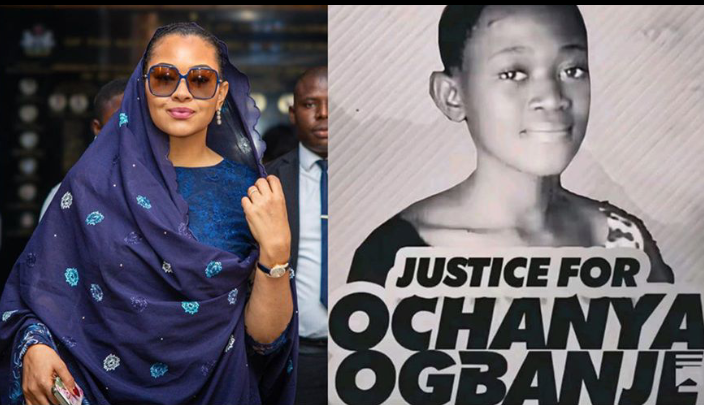
“The Family of Late Ochanya Should Write a Petition to Me” — Senator Natasha Akpoti Demands Justice for 13-Year-Old Rape Victim

Senator Natasha Akpoti-Uduaghan of Kogi Central has reignited public attention on the heartbreaking case of late Ochanya Ogbanje, a 13-year-old schoolgirl whose death in 2018 from complications of sexual abuse sparked outrage across Nigeria. In an emotional post shared on her official page, the senator expressed shock and dismay after discovering that the perpetrators accused in the case were discharged and acquitted. Declaring that justice must not be buried with the young girl, she called on the family of the deceased to formally petition her office so she can take up the matter in the National Assembly.
“Seven years ago, the heart-wrenching story of little Ochanya devastated me. I thought the perpetrators were in jail. Alas, they were discharged and acquitted,” she wrote. “The family of late Ochanya Ogbanje should write a petition to me: Senator Natasha Akpoti-Uduaghan, Room 2:05, Senate Wing, National Assembly Complex, Abuja. For our children, I stand for Justice for Ochanya.”
Her statement has since gone viral, drawing renewed conversations around gender-based violence, child protection laws, and the gaps in Nigeria’s justice system that continue to fail victims of sexual abuse. Many Nigerians who still remember the painful story of Ochanya expressed a mix of gratitude and frustration — gratitude that a sitting senator has taken up the cause, and frustration that it took years and persistent public advocacy for the case to resurface.
Ochanya’s story is one that shocked the conscience of a nation. In 2018, the 13-year-old student of Federal Government Girls College, Gboko, Benue State, died from complications linked to vesicovaginal fistula (VVF), a medical condition caused by prolonged sexual abuse. Investigations revealed that she had been allegedly raped repeatedly by her guardian, Andrew Ogbuja, a lecturer at Benue State Polytechnic, and his son, Victor Ogbuja. Her death sparked outrage, with civil society groups, gender rights activists, and ordinary Nigerians demanding swift justice. The case became a symbol of the deep-rooted crisis of child sexual abuse and the culture of silence that allows it to thrive.
However, despite years of litigation and advocacy, justice for Ochanya has remained elusive. The accused were recently discharged and acquitted, a development that triggered disbelief and anger among many Nigerians. Senator Natasha’s reaction came after she came across online advocacy videos made by social media activist @miss_natural1, who has been revisiting the details of the case and calling for renewed attention. Moved by the videos, the senator vowed to take concrete steps to ensure accountability and prevent such tragedies from happening again.
“For our children, I will stand,” she affirmed in her message. “Justice for Ochanya is justice for every child who has been silenced, every victim who was told to endure, and every parent who lost a child to abuse and negligence.”
Since her statement, social media has been flooded with comments praising her compassion and courage. Many described her as one of the few politicians in Nigeria willing to use her platform for social justice. “This is leadership,” one user wrote. “It’s not just about building roads or hospitals, it’s about building a society that protects its most vulnerable.” Another added, “Ochanya’s spirit must not rest until justice is done. Thank you, Senator Natasha, for reopening this wound that Nigeria tried to forget.”
Natasha Akpoti-Uduaghan, known for her fearless advocacy on women’s and children’s rights, has built a reputation as one of the most vocal female senators in Nigeria’s current political space. Before joining the Senate, she was widely recognized for her humanitarian work and advocacy for the rights of marginalized communities in Kogi State and across Nigeria. Her latest intervention in the Ochanya case signals her intention to push legislative and institutional reform to strengthen the protection of minors and ensure perpetrators of sexual violence face the full weight of the law.
Observers note that her public invitation to the family to submit a petition directly to her office is a significant gesture, as it indicates her readiness to formally reopen the case through the Senate Committee on Women Affairs, Human Rights, or Justice. Legal analysts say that while the acquittal of the accused persons might complicate the matter, the National Assembly still has the power to demand an independent review or a fresh probe into lapses in the investigation and prosecution process.
The renewed attention on Ochanya’s case also highlights the broader systemic issues within Nigeria’s judicial system when it comes to gender-based violence. Many similar cases are either underreported, poorly investigated, or drag on for years without resolution. In 2020, the Nigerian Governors’ Forum declared a state of emergency on rape and gender-based violence following nationwide protests and advocacy campaigns. Yet, activists say little has changed in real terms. Conviction rates remain low, and survivors continue to face stigma, intimidation, and victim-blaming.
Senator Natasha’s intervention, therefore, resonates beyond one case. It has become a rallying cry for justice reform and accountability. By linking her name and office directly to the pursuit of justice for a long-forgotten child, she has reignited hope among advocacy groups that institutional power can still be used for good. Several human rights organizations have already responded to her call, offering to connect Ochanya’s family with her office to prepare a formal petition.
Beyond politics, many Nigerians see in this moment a rare chance to set a national example — to show that even after years, justice delayed does not have to mean justice denied. Ochanya’s death may have happened seven years ago, but the pain of her story still lingers in the hearts of parents, teachers, and young girls across the country. Her name has become synonymous with innocence lost and the collective failure of adults to protect the vulnerable.
As Senator Natasha put it, “We owe it to our children to build a country where no one can harm them and walk free. Ochanya’s case cannot end in silence. Her voice must be heard through us.”
The story continues to spread, gathering momentum as more Nigerians demand answers. Has justice truly been served? What happened to the evidence, the medical reports, and the testimonies that once made national headlines? These are the questions now resurfacing in public discourse. Many are urging the Senate, the Ministry of Justice, and the National Human Rights Commission to take up the matter once more.
In a country where so many tragic cases fade into oblivion, Senator Natasha’s words have rekindled a spark of accountability. Whether the system will respond remains to be seen, but one thing is clear — the fight for justice for Ochanya Ogbanje is not over. And as long as voices like Natasha Akpoti’s continue to echo through the halls of power, there may yet be hope that Nigeria will one day be a place where every child is safe, and every victim is heard.
For now, all eyes turn to Abuja, where a senator’s call for justice could finally breathe new life into a story the nation should never have forgotten.


